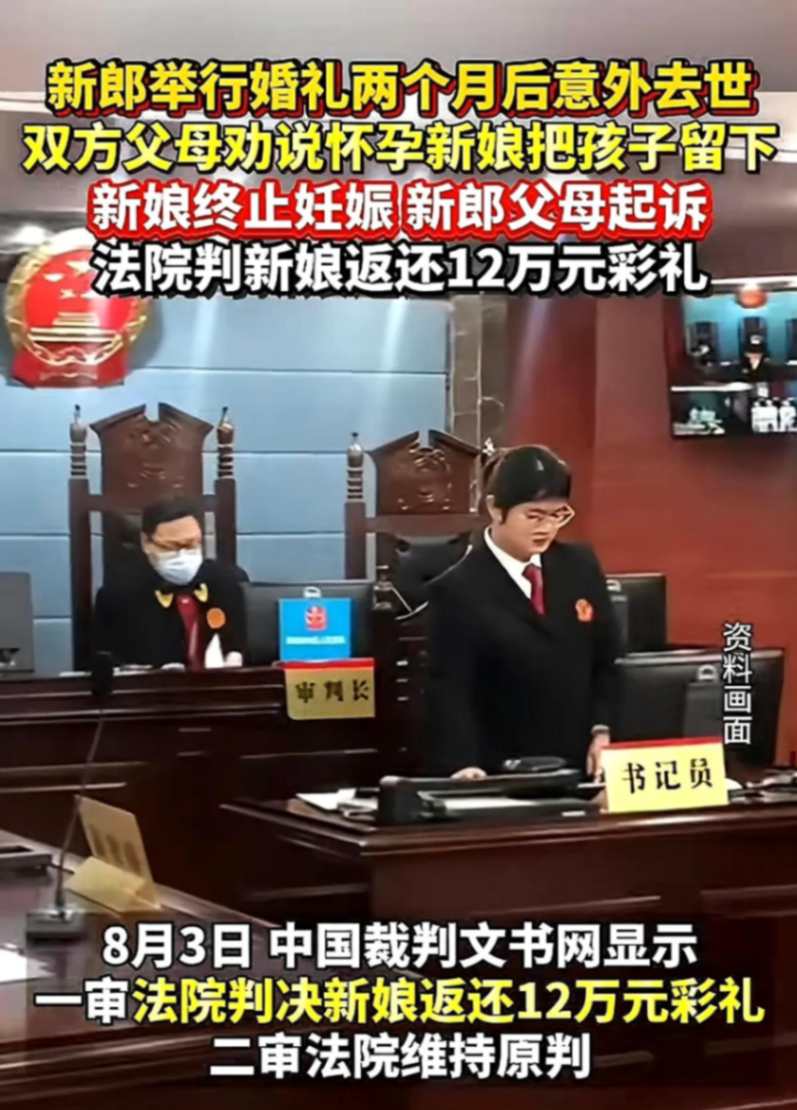Groom Dies, Bride Aborts—Told to Return ¥120,000
A tragic love story in Henan highlights the clash between traditional bride price customs and modern marriage laws, stirring emotional and legal debates.

The Unexpected Tragedy of Guo Mou and Niu Mou
In Henan Province, a story unfolded that has stirred emotions and debates across China. Guo Mou and Niu Mou, a couple deeply in love, began their life together in September 2023. By December, Niu Mou was pregnant, and in March 2024, they held a vibrant wedding celebration steeped in tradition. The groom's parents paid a hefty bride price totaling 292,290 yuan, including the customary “three golds” jewelry set. However, the joyous occasion was shadowed by one important detail — the couple never legally registered their marriage.
Tragedy struck on May 15, 2024, when Guo Mou died in an accident just months after their wedding. The loss was heartbreaking, but the story that followed has captivated the public, revealing the complex intersection of custom, law, and personal grief. 💔
Pregnancy Termination and the Bride Price Lawsuit
Following Guo Mou's passing, the two families talked about the unborn child. While initially, Niu Mou intended to keep the pregnancy, she ultimately chose to terminate it without informing her late fiancé's family. This decision became a pivotal point of conflict. The groom’s parents then filed a lawsuit demanding that Niu Mou return 150,000 yuan of the bride price, asserting that the payment was made for the purpose of marriage—a union that had no legal standing due to the lack of registration.
The court’s decision: After weighing the facts, the first-instance court ordered the bride to return 120,000 yuan, factoring in the cohabitation period, pregnancy termination, and the absence of official marriage registration. Niu Mou appealed, but the higher court upheld the ruling, closing the case in August 2024. 📜⚖️
The Clash Between Tradition and Law
This case throws a spotlight on the complex relationship between deep-rooted rural customs and modern legal frameworks. In many parts of China, including Henan, the bride price is more than a transaction—it's a sacred promise and a family's hard-earned savings invested in a marriage. However, the Civil Code stresses legal registration as the definition of marriage, creating friction between heartfelt traditions and statutory requirements.
The court’s nuanced ruling reflects this tension—acknowledging both legal principles and emotional realities, such as the physical and psychological toll on Niu Mou due to pregnancy termination. It hints at the rising awareness within the judiciary to balance customary respect with legal precision, a balancing act that doesn’t always satisfy everyone.
Public Reaction and the Bigger Question
On social media platforms like Weibo, netizens remain divided. Some argue it's unfair to demand money from a woman who lost her love and suffered trauma, while others maintain that the bride price is a legitimate claim given the marriage's unregistered status. This ongoing debate highlights a universal struggle: how do we disentangle emotion from legal obligation? 💭❤️💸
Ultimately, this case challenges us to rethink the meaning of marriage in a modern world where customs meet legalities. It asks: should emotional circumstances mitigate financial agreements, or must laws remain steadfast regardless of personal tragedy? The answer might shape future cases across areas where culture and law collide.
Conclusion: A Case That Resonates Beyond Henan
The story of Guo Mou and Niu Mou is more than a legal matter; it's a reflection of societal evolution. It underscores the need for clear communication, legal formalities, and compassionate understanding in matters of the heart and money. As traditions fade or adapt, one thing remains certain: marriage, in any form, intertwines love, commitment, and responsibility in ways far more complex than any bride price can measure.
For now, the ¥120,000 return stands as a symbol of this difficult balance — a poignant reminder that love and law sometimes travel parallel roads that don't always intersect easily. 💡⚖️




